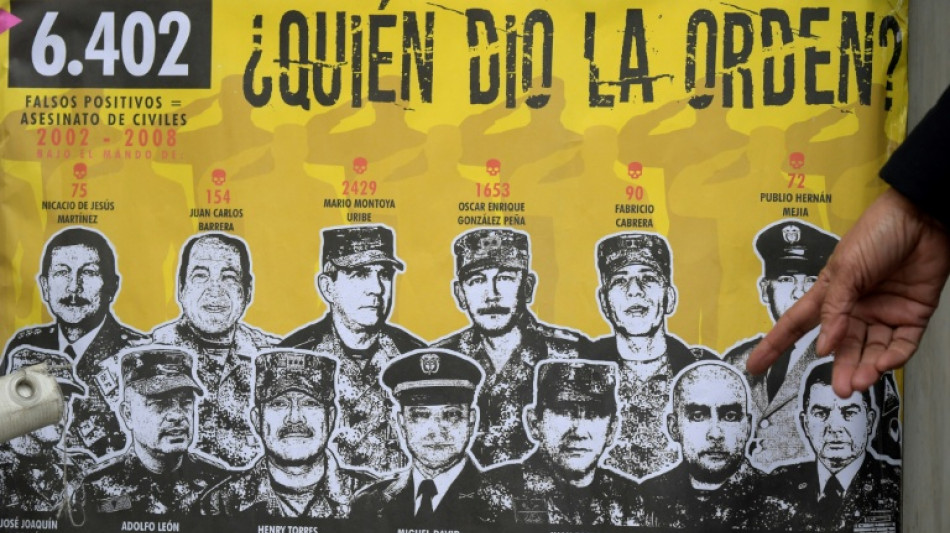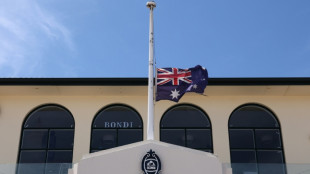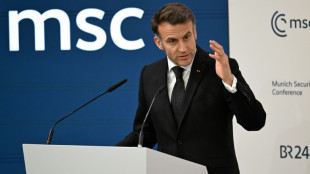

Colombian court issues first sentences for ex-soldiers over civilian killings
A Colombian tribunal on Thursday issued its first sentences for former soldiers over the killing of civilians during the country's decades-long armed conflict, ordering 12 of them to carry out work including building memorials for their victims.
The retired military personnel, who had falsely tallied the civilians as leftist guerrilla fighters killed in combat, were sentenced to do reparations for the families of 135 victims for a total of eight years each.
It is the highest sentence that can be handed down by the Special Jurisdiction for Peace for people who cooperate and acknowledge guilt.
The tribunal known by its Spanish acronym JEP was set up under a landmark 2016 agreement that saw the FARC guerrilla group lay down arms.
The 12, including two colonels, acknowledged their role in the murders and disappearances carried out between 2002 and 2005.
It was part of a crime that has become known in Colombia as "false positives" -- recording dead civilians as fallen combatants to inflate military successes.
Thousands of civilians, mostly young, poor and unemployed, were killed, and in return, soldiers were decorated or received days off as a reward for achieving targets.
According to the JEP, the main perpetrators were members of the armed forces who sometimes worked in cahoots with other armed groups or even civilians.
"No Colombian should have died as a result of a criminal network tasked with selecting, killing, and disappearing innocent people... with the sole purpose of turning them into statistics," tribunal president Alejandro Ramelli said in handing down sentence in Bogota Thursday.
Blanca Monroy, whose son Julian became one of the "false positives" aged just 19 nearly 20 years ago, said the JEP process had brought her some peace.
Without it, the 66-year-old told AFP, "I would never have known what happened to my son, nor that he asked to speak with me before he was killed."
- Guerrilla uniforms -
The tribunal has documented at least 6,402 "false positives" cases between 2002 and 2008 during the presidency of Alvaro Uribe, known for his iron-fisted crackdown on insurgents.
In some cases, people were tricked into getting into trucks, only to be shot en masse and buried in communal graves.
Some were changed into guerrilla uniforms after their death and presented to the press in what became the worst scandal in the history of Colombia's military.
Uribe, who was a critic of the 2016 peace agreement, has denied there was any policy to kill civilians.
He was sentenced to 12 years of house arrest last month in a witness tampering case, found guilty of asking right-wing paramilitaries to lie about links to him as they committed atrocities while fighting FARC rebels.
Retired general Mario Montoya, who was army commander under Uribe, has rejected any responsibility in the "false positives" case. He faces a trial before the JEP and risks going to prison.
As part of their sentence, the 12 former soldiers who did admit their role will be put to work to construct memorials for their victims and community centers in Indigenous communities in the Caribbean, where the crimes were mostly committed.
Their mobility will be restricted to the places where the reparations work is being carried out.
The sentence can be appealed, and the years some of the soldiers have already spent in prison will be taken into account for possible sentence reductions.
On Tuesday, the tribunal also issued its first sentences for ex-FARC leaders over the kidnapping of tens of thousands of people during its war against the state.
The JEP, created to pursue justice for victims of the conflict, took more than seven years to issue its findings against the FARC, a Marxist group that terrorized Colombia with a five-decade campaign of bombings, assassinations and kidnappings.
Seven ex-FARC defendants were sentenced over 21,396 kidnappings and ordered to carry out reparations work.
Some victims have described the sentences as too lenient.
L.Chatterjee--MT




